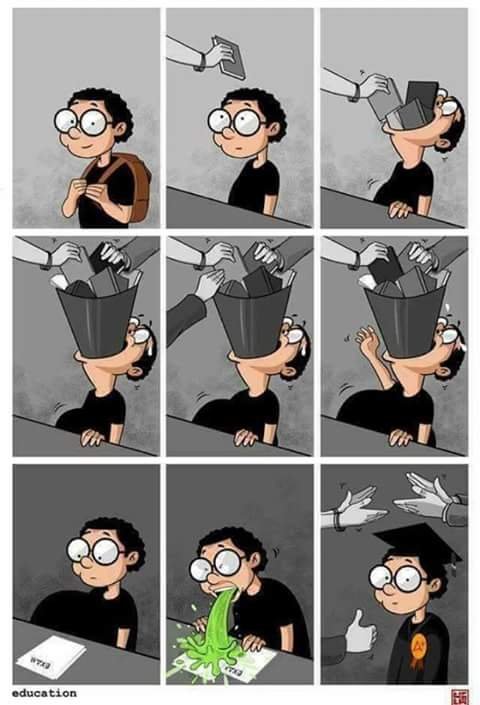Education📖: questioning the status quo
Education is not new, almost everyone at one time or the other have acquired education either formally or informally. In this piece, I restrict education here to mean formal education.
Merriam-Webster's dictionary defines education as "the knowledge, skill and understanding that you get from attending a school, college or university". If this definition is anything to go by, then that means that different people can get different levels of education from a single issue or subject since they will understand it differently. This implies that to educate individuals effectively, different processes of education should be applied based on each individual's peculiarity.
THE STATUS QUO
The current state of education is not encouraging. In many schools, testing of the knowledge of students is the same for all, irrespective of the student's peculiarity. Every student is judged by a standard which may or may not favour the student. This is akin to judging both a fish and a lizard by their ability to climb a tree. This however will be looked into elaborately in a subsequent piece.

Image: Schools today courtesy of Physics page
Currently, in our schools especially universities, the prevalent pedagogic method is rote learning, which concentrates on and encourages the use of memory rather than intelligence. This method is encouraged by students and lecturers alike. The lecturer barely teaches the student the 'how' and 'why' of a phenomenon, but mainly gives facts about such a phenomenon, thereby discouraging creativity. As regarding the testing of the students, the lecturer judges the student based on a marking scheme. This way, any thoughts contrary to the marking scheme no matter how logically right or true it is, is vehemently discouraged and disregarded as long as it doesn't conform with the parochial algorithm of the marking scheme.
The students on their own part flow with the tide by rote memorising to survive. In what way will this method help in producing creative minds? Does it not defeat the whole purpose of education? Surely it does because it gives no room for creativity.
For example, the widely revered physicist Albert Einstein prior to his university education had stellar performance in Mathematics and Physics, but the same can not be said of his undergraduate days where he did not perform impressively in physics as usual, as a result of rote learning.
.jpg)
Image: Einstein's matriculation certificate showing grades on a scale of 1-6 with being the highest mark. Courtesy of Wikkipedia
This can be confirmed in one of his statements saying "the spirit of learning and creative thought was lost in strict rote learning". Furthermore, from Kelvin Brown's book titled "Reflections on relativity", it is noticed that Einstein was not interested in that modus of learning, that he opted for independent study of the works of Kirchoff, Hertz, Poincare, Maxwell, Helmholtz, etc at the expense of his lectures.
According to the book, he was regarded by the academic community as "an awkward slightly lazy, and certainly intractable young man who thought he knew more than his elders or betters", a typical statement probably criticizing his disagreement to some erstwhile accepted theories. If he had probably stock with the rote learning, maybe we would have not benefitted from his 'rebellion'.
Also, during my undergraduate days, I had a friend named Michael Pax who we all celebrated as having an exceptional analytic skill. He was usually the last bus stop to all our mathematics problems. In one of our courses - Quantum Mechanics, he introduced what he called "the Pax integral", which was a short cut for solving complex momentum functions. Funny enough, it worked just fine. There was never a problem we tried it on that it failed. He also introduced what he called "Pax triangle" which was a short cut for expansions involving functions which exhibited non-linear perturbations I think. After the examination, Pax told me that he used the Pax integral, and we both confirmed that it arrived at the correct answer. When the results were out, he made a D. Probably, his fate was decided by a marking scheme; he was never called to explain his unique process. Who knows what would have come out of it?
In conclusion, the current teaching process where the survival and success of a student is dependent on how well the student can memorize mindlessly the things he/she is 'taught' and how well such memorized facts are replicated on an examination paper only ends up burying students' potential and questioning ability while encouraging mediocrity.

Great thoughts you shared here, I simply agree with you, Education is in its dying state, The patter of learning is fighting the capacity of learning.
Aptly said. Thank you.
So true @ikechi. Nice post, keep steeming
Thanks @gloeze, I will